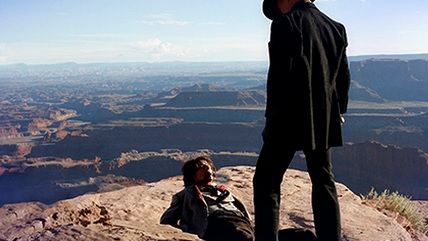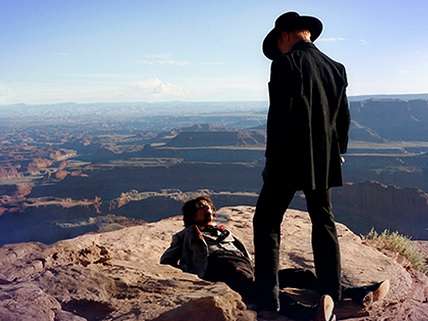Fall TV Season Gets Time Travel Type Shows Based on Older Shows and Films
There's time traveling in the shows, and the shows are a bit of a time travel too.


Westworld. HBO. Sunday, October 2, 9 p.m.
Timeless. NBC. Monday, October 3, 10 p.m.
Conviction. ABC. Monday, October 3, 10 p.m.
No Tomorrow. The CW. Tuesday, October 4, 9 p.m.
Frequency. The CW. Wednesday, October 5, 9 p.m.
In 1966, when CBS unveiled a show called It's About Time in which a pair of astronauts pierce the space-time continuum and discover that the human race is descended from a couple of cavemen played by Joe E. Ross and Imogene Coca, the old Philadelphia Bulletin was so unhinged that it called for congressional hearings. While I certainly share the conventional civic wisdom that TV critics should have subpoena power, not to mention droit du seigneur, I believe the Bulletin was a little bit ahead of the curve. A congressional investigation of time-travel shows wasn't probably warranted until 1992, when the characters of NBC's Qauntum Leap jumped back to the 1950s to put the idea of real estate into the head of a 12-year-old Donald Trump. If that didn't call for a "Have you no decency, sir?" moment…
Anyway, I wonder what the folks at the Bulletin would have made of television this week, which is mostly one long orgy of time travel, both literal and metaphorical. As William Faulkner might have said if he'd had any Nielsen smarts, the past is never dead, it's not even in reruns yet.
The literal part of the week's temporal excursions takes part in NBC's Timeless and The CW's Frequency, in which characters flit around from decade to decade, trying to debug the past.
In Frequency—based on the 2000 Randy Quaid film of the same name—all the temporal tampering is aimed at a single event: a 20-year-old cop killing. NYPD homicide detective Raimy Sullivan (Peyton List, Blood & Oil) has built a whole career out of trying to prove she's nothing like her father Frank (Riley Smith, Nashville), murdered by his cohorts two decades earlier after going rogue on an undercover assignment.
But when her late father's old ham radio set crackles to life during an electrical storm, Raimy finds herself talking to pop across the years. As family reunions go, this one is a bit on the harsh side. "You're telling me that in 20 years I'm gonna be on the force with my daughter?" Frank says delightedly after learning she's a cop. "No, you're dead," replies Raimy. Try wringing a Hallmark moment out of that. Worse yet, after Frank convinces her that he was—you guessed it!—framed, Raimy passes him information on how to avoid his death, with disastrous butterfly-effect results. Thus are launched what The CW hopes are 100 episodes or so of attempts to contain the ripple effects.
Despite your understandable and probably entirely justified fear that the success of a show about a time-traveling ham radio will lead to a painful rash of sequels about time-traveling toaster-ovens and Waring blenders, Frequency is not so bad. The paradoxes of time-travel, though familiar to anybody with even a passing acquaintance with sci fi, are artfully woven in, and List is quite appealing as a daughter remaking her long-held image of a father she hardly knew. The action in the pilot episode moves a little fast, but with any luck, now that the show's premises are established, its metabolism will slow below hummingbird levels.
Timeless doesn't admit to being based on anything, but it's sure a dead ringer for the marvelously cheesy and lovably stupid ABC series The Time Tunnel, in which government budget-cutting led to a couple of scientists getting marooned in an experimental device with an amusingly malevolent glitch.
Every week it dropped them onto the Titanic or the middle of Custer's Last Stand; and every week their colleagues back in 1966 gave the machine a good hard kick just in time to save them by getting them tossed over to Krakatoa or the Alamo. (It's only fair to note I could be mistaken about where Timeless was stolen from. A bunch of Spanish producers are suing, claiming it was ripped off from their show El ministerio del tiempo. Probably some court will have to retain Dr. Who and his TARDIS gizmo to get this straightened out.)
Regardless of which perfidious idiot is responsible, Timeless stars Malcom Barrett (Better Off Ted), Matt Lanter (Ultimate Spider-Man) and Abigail Spencer (Suits) as a government posse chasing around the ages in pursuit of a hijacked time machine piloted by a renegade security agent (Goran Visnjic, Extant) who's trying to rewire such events as the crash of the Hindenburg in hopes of raising his score on the SAT history test or something like that.
Timeless is quite funny, sometimes intentionally. My favorite line in the pilot came when Spencer's character, a history professor when she's not grappling with Nazi assassins in 1937, is told by her boyfriend—the department chair—that she isn't getting tenure. Murmurs her sympathetic sister: "What's the point of even sleeping with the boss?"
More often, the laughs are inadvertant, though still booming. Spencer's character broods about whisking away to the 1930s in an anachronistic underwire bra—but once there, blithely plucks a coin from her purse to pay a busfare, apparently from that supply of Indian-head nickels that history professors carry in case of a chance encounter with a sarsaparilla stand. Or her question to the professor who developed the time machine: "Why would you be stupid enough to invent something so dangerous?" Sheepish replay: "I didn't count on this happening." Clearly he never saw The Time Tunnel.
If Timeless stands a good chance of becoming the new season's guiltiest pleasure, HBO's Westworld is a bonafide E-ticket of a show—something of a surprise, since it shut down production for three months earlier this year, usually a sign of creative catastrophe, and what little buzz there's been about it has mostly concerned the world's most scandalous consent form that was required of the cast.
Westworld is based on the 1973 Michael Crichton film of the same name in which the hyper-realistic androids at an Old West theme park turned on the human customers. (Charitably, we will say nothing of the cheapjack sequel Futureworld or the 1980 CBS television adaptation Beyond Futureworld, which lasted a mere three episodes at a time when such a quick hook was virtually unthinkable.
Crichton's film tried to ponder some deeper themes about the relationship of Creator and Created, but they mostly got buried under the special effects, impressive in their day. HBO's version, created by Jonathan Nolan (The Dark Knight and Person of Interest) and Lisa Joy (Pushing Daisies and Burn Notice), is no slouch at effects, but it's got a more thoughtful side, not to mention a ton more cybergenitalia.
The series shares the film's conceit of a massive Old West theme park populated by stunningly lifelike robots known as Hosts and patronized by wealthy customers known as Guests—or, to the robots, who are unaware of the artificiality of their world, as Newcomers. Together they live out various interlocking adventures (shootouts, treasure hunts, bank robberies) devised by the park's scriptwriters and drawn with such meticulous detail and intricate backstories that it's often difficult to tell Guests from Hosts.
But some cracks are starting to appear in the park's carefully crafted facade. Though most of the Guests are merely looking for a slightly tangier version of a dude ranch, a disquieting number seek darker pleasures ranging from murder to necrophiliac rape, all accommodated by management because the victims are only robots, programmed not to retaliate. Some of the park managers worry that continuing to heighten the realism of the brutality will turn it unpleasant for the Guests, but the real question, left unspoken, is the flipside: What if it doesn't?
There's a hardware problem, too. Though the Hosts' memories are supposedly wiped clean after each adventure, they actually remain in place, waiting to be overwritten like deleted computer code. And, following the latest round of regular upgrades, one or two of the robots show signs of being able to access those old memories, as if they now have a subconscious—a very violent one. Is that an accident? Or is the melancholic if not mad park founder Robert Ford (Anthony Hopkins) toying with the idea of giving his creations something like free will?
Bouncing through this world, and sometimes altering its course, are the park's top programmer, Bernard Lowe (Jeffry Wright, the Hunger Games films), the first to notice something amiss with the Hosts; farm-girl Host Dolores (Evan Rachel Wood, HBO's Mildred Pierce), whose resurfacing memories include the receiving end of 30 years worth of rapes and murders; and the Man in Black (James Marsden, the X-Men films), an increasingly depraved Guest who suspects the theme park is actually a game with a higher level, which he's determined to reach. Joining him on this journey through the intellectually intriguing and viscerally engaging Westworld is a hell of a ride.
There's no real time travel in the CW's No Tomorrow; it just feels like a visit to one of the zillion or so love-in-the-time-of-the-apocalypse rom-coms over the past decade or so. Canadian TV actress Tori Anderson plays Evie, a repressed, socially inept and altogether harried manager at an Amazon.com-ish electronic commerce company. Her love life is almost as deflated as her clout with her sullen employees. ("As we learned last week, The Analyst and Anal Lust are two very different books.")
Things look up briefly when she discovers a handsome stranger named Xavier (Joshua Sasse, Galavant), who she's been crushing on since a chance encounter at a rutabaga stand, lives in her neighborhood. Unfortunately, he has bad news: "The world is ending. Humankind only has 8 months and 12 days left on Earth," a secret (impending asteroid collision) he picked up as a copy editor at a science magazine.
He urges Evie to quit her job, create an Apocalyst of things she's always wanted to do, and have sex with him, not necessarily in that order. (And it turns out she's already on his Apocalyst, right after "sleep with the taco truck girl" and "sleep with the other taco truck girl.")
If all of this sounds familiar—really familiar if you're a fan of Como Aproveitar o Fim do Mundo, the Brazilian sitcom on which it's based—No Tomorrow nonetheless has some quirky laughs, and Anderson is an appealingly inept protagonist. You could do worse with your time—and surely will if you get tangled up with ABC's daft Conviction.
Very loosely based on the BBC series of the same name, Conviction follows a police unit that examines murder cases—but for no longer than five days, because it's a Twitter world!—for wrongful convictions. The team is headed by Hayes Morrison, (Hayley Atwell, Marvel's Agent Carter), who finished first in her class at Harvard Law, won 95 percent of her criminal cases as a defense attorney, and then ignominiously disappeared after getting caught doing cocaine and boinking students in a law school class she was teaching. In short, Chelsea Clinton's evil twin from a parallel and even more dysfunctional universe! Any way we can beam back to the days of Amy Carter?


Show Comments (44)